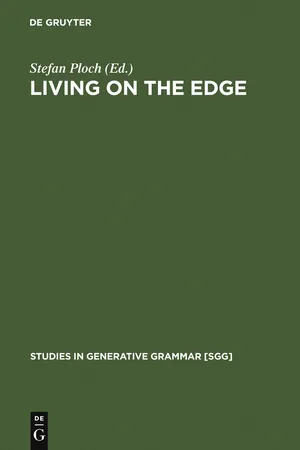
- 747 pages
- English
- PDF
- Available on iOS & Android
eBook - PDF
About this book
This collection of papers by an international group of authors honors Jonathan Kaye's contributions to phonology by expanding some of Kaye's ideas to a variety of theoretical topics and languages. The set of ideas discussed or used in this collection includes: empty categories, licensing relationships and constraints, a restrictive two-levelled approach to phonology (without rule ordering or constraint ranking), a restrictive theory of syllabic representation (without the codas constituent and with exclusively binary branching), theories of the phonology-phonetics interface in which phonology is motivated independently of phonetics, and the metatheoretical flaws in a number of widely accepted but rarely questioned views on phonology.
Frequently asked questions
Yes, you can cancel anytime from the Subscription tab in your account settings on the Perlego website. Your subscription will stay active until the end of your current billing period. Learn how to cancel your subscription.
No, books cannot be downloaded as external files, such as PDFs, for use outside of Perlego. However, you can download books within the Perlego app for offline reading on mobile or tablet. Learn more here.
Perlego offers two plans: Essential and Complete
- Essential is ideal for learners and professionals who enjoy exploring a wide range of subjects. Access the Essential Library with 800,000+ trusted titles and best-sellers across business, personal growth, and the humanities. Includes unlimited reading time and Standard Read Aloud voice.
- Complete: Perfect for advanced learners and researchers needing full, unrestricted access. Unlock 1.4M+ books across hundreds of subjects, including academic and specialized titles. The Complete Plan also includes advanced features like Premium Read Aloud and Research Assistant.
We are an online textbook subscription service, where you can get access to an entire online library for less than the price of a single book per month. With over 1 million books across 1000+ topics, we’ve got you covered! Learn more here.
Look out for the read-aloud symbol on your next book to see if you can listen to it. The read-aloud tool reads text aloud for you, highlighting the text as it is being read. You can pause it, speed it up and slow it down. Learn more here.
Yes! You can use the Perlego app on both iOS or Android devices to read anytime, anywhere — even offline. Perfect for commutes or when you’re on the go.
Please note we cannot support devices running on iOS 13 and Android 7 or earlier. Learn more about using the app.
Please note we cannot support devices running on iOS 13 and Android 7 or earlier. Learn more about using the app.
Yes, you can access Living on the Edge by Stefan Ploch in PDF and/or ePUB format, as well as other popular books in Languages & Linguistics & Grammar & Punctuation. We have over one million books available in our catalogue for you to explore.
Information
Table of contents
- Preface
- Curriculum vitae
- Testimonials
- Publications
- Instead of an introduction
- 1 General issues
- 1.1. Acquisition
- Meno’s paradox and the acquisition of grammar
- On the logical order of development in acquiring prosodic structure
- 1.2. Computation
- On the computability of certain derivations in Government Phonology
- 1.3. The organisation of grammar
- Structure paradoxes in phonology
- An x-bar theory of Government Phonology
- 1.4. Philosophy of science and metatheory
- Meta-phonological speculations
- Metatheoretical problems in phonology with Occam’s Razor and non-ad-hoc-ness
- 2 Elements: segmental structure and processes
- Eerati tone: towards a tonal dialectology of Emakhuwa
- Government Phonology and the vowel harmonies of Natal Portuguese and Yoruba
- Palatalisation in Brazilian Portuguese
- Two notes on laryngeal licensing
- On spirantisation and affricates
- 3 Structure
- 3.1. Branching onsets
- Branching onsets in Polish
- Are there branching onsets in Modern Icelandic?
- Remarks on mutæ cum liquidā and branching onsets
- Defective syllables: the other story of Italian sC(C)-sequences
- 3.2. “Codas”
- Remarks on prenominal liaison consonants in French
- The phonotactics of a “Prince” language: a case study
- On the syllabification of right-edge consonants – evidence from Ahtna (Athapaskan)
- Licensing constraint to let
- 3.3. Empty categories
- Empty and pseudo-empty categories
- Unlicensed domain-final empty nuclei in Korean
- Unreleasing: the case of neutralisation in Korean
- 3.4. “Syllabic consonants”
- /r/ syllabicity: Polish versus Bulgarian and Serbo-Croatian
- The syllabic nasal in Japanese
- 3.5. Templates and morphology
- Template and morphology in Khalkha Mongolian – and beyond?
- A non-derivational analysis of the so-called “diminutive retroflex suffixation”
- Why Arabic guttural assimilation is not a phonological process
- 5.6. Metrical structure
- On a certain notion of “occurrence”: the source of metrical structure, and of much more
- References
- Subject index
- Language index
- Names index
- Contributors